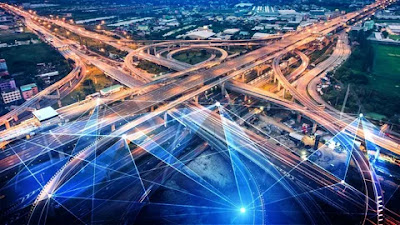Smart transportation is a high-demand technology due to its advantages over traditional transportation systems.
 |
| Smart Transportation |
Smart transportation systems are multimodal transportation systems and infrastructure that are efficient and sustainable and can provide a high level of intelligence and performance. The use of advanced technology such as electronics, computers, information and telecommunication, and advanced sensors to offer information to consumers in order to improve the transportation system's safety and efficiency is referred to as a Smart Transportation system.
Smart Transportation is a high-demand technology because of its advantages over traditional transportation systems, such as time efficiency, cost efficiency, high security, and faster speed. As a result, incorporating new technological features into existing or traditional transportation systems is extremely difficult due to a lack of open interfaces, which leads to communication gaps between technically advanced and traditional systems. The expansion of the smart transportation market is hampered by such large transportation infrastructure investment trasransportation systems are becoming more popular as a means of reducing traffic congestion, improving traffic management, and reducing the environmental impact of greenhouse gas emissions from vehicles. Electronic toll collection, ramp metres, traffic light cameras, traffic-signal coordination, transit signal priority, and traveler-information systems are just a few of the applications for these systems in transportation. These are also utilised in fleet management, toll collection, ticketing, telematics, and traffic monitoring. Transportation systems that are smart One of the primary factors for market expansion is the ability to improve safety and security by providing real-time traffic and route information.
Because of the technology's capacity to reduce traffic congestion and increase road safety by effectively monitoring and managing vehicular traffic, Smart Transportation is gaining popularity. Reduced crash rates and increased road safety for drivers, passengers, and pedestrians are two primary driving factors for smart transportation systems in highways. Highways are increasingly being outfitted with modern radar and in-pavement warning lights that alert approaching motorists. The Department of Transportation (DOT) is churning out creative ways to relieve traffic congestion on roads, such as ramp metering.
Intelligent transportation, often known as smart transportation, is a type of modern transportation infrastructure that strives to provide novel traffic and transportation management services. It can be used for parking management and guiding, passenger information, and traffic management, among other things. Intelligent transportation systems (ITS) are cutting-edge applications that deliver cutting-edge transportation and traffic management services. Using technology like as automobile navigation, traffic signal control systems, speed cameras, and other real-time data and computational technologies, it allows numerous users to be more coordinated and informed. Infrastructure upgrades, regulatory requirements for sustainable fuels for public transportation vehicles, and the deployment of systems to efficiently deliver mobility services to ever-expanding cities are all ways to attain this Smart Transportation information.
The Smart Transportation market is expected to grow due to factors such as increased demand for efficient transportation networks around the world, government initiatives for the development and promotion of green fuels, and increased demand due to increased road safety and traffic congestion issues.



Comments
Post a Comment